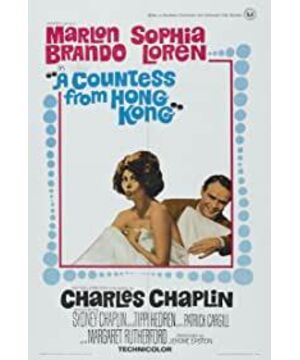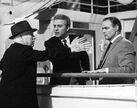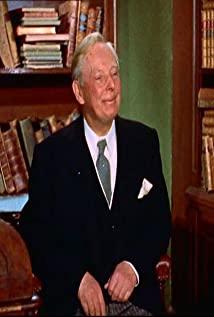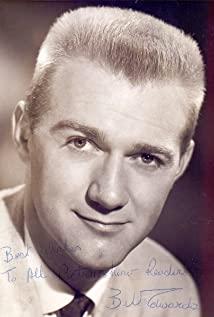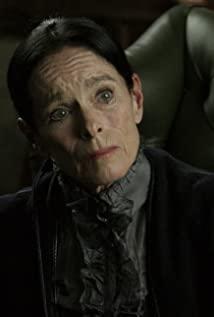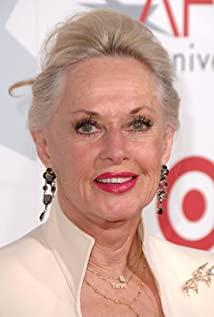After reading Bazin's book, I noticed one thing, that is, Chaplin's last work "The Countess of Hong Kong", he did not give a comment, but Hou Mai wrote a comment. I haven't watched this movie, and I don't even know about it. Before, I always thought "Stage Spring and Autumn" was his last work. So I checked the information, and it turned out that Bazin had passed away ten years after "The Countess of Hong Kong" was released. At this time, a curiosity surged from my heart, and this curiosity was divided into two, the first is the curiosity about this last work of Chaplin. What would a Chaplin movie starring Marlon Brando, Sophia Loren and Tibi Headley? Secondly, I am curious about how Bazin would feel if he could see this film?
In this way, with curiosity, I finished watching this film. After reading it, the first curiosity disappeared as expected. But as for the afterthoughts, to be honest, it is difficult for me to say clearly. This movie does not appear to be "Chaplin". It does not have the playfulness and bitterness of early Charlotte-style works, nor the irony and deepness of later works; it is not a regression, nor a summary; it can neither make you laugh or move, nor is it so boring or boring. Rigid...In short, if you want to summarize it in one word, it's weird.
Then, I couldn't help feeling a little strange about my "weird" conclusion. Slowly, I realized that the reason lies in the source of this conclusion, which is actually lack of fairness. Because this conclusion does not stem from the absoluteness of the film, but only emerges after comparing it with other works of Chaplin. Of course, I am not saying that comparing this movie with other works by Chaplin is wrong. On the contrary, I think it is quite practical and effective to examine the work of a director. But here, as far as the "Countess of Hong Kong" is concerned, I think the comparison is not preferable. Because I gradually realized that the reason why Chaplin made this film like this is probably because we hope that we will not compare this film with all his previous works. In other words, he used his last film to deny the connection with the previous work, and at the same time stripped away the meaning of comparison, thus highlighting the value of this work. Perhaps this is my over-speculation. But I think that for people like Chaplin, over-speculation is always better than no guesswork.
After making a supplementary explanation of "weird", I recalled my second curiosity. How would Bazin feel about this movie? I think, in this movie, Bazin may be difficult to find "Charlotte's incarnation". I agree with Bazin's view of "Mr. Verdoux", Mr. Verdoux is the opposite of Charlo. But in "The Countess of Hong Kong", at least as far as I am concerned, I don't see any antithesis of Charlotte or any incarnation of alienation. I think the reason for this is not only determined by the "nondescript, indeterminate" style of the entire film, but also by Chaplin's almost "absent" appearance in this film. To be honest, I can hardly imagine that Chaplin would appear briefly in a "Chaplin movie" for less than twenty seconds, show up like a dragon, and disappear. This is unique in the pedigree of Chaplin's movies. In this regard, I think Bazin must have a lot to say.
Of course I cannot compare with Bazin, so there is not much I can say. I just feel that this must be intentional by Chaplin. I want to speculate about his intentions by retelling his two appearances briefly. In the first appearance, the old waiter played by Chaplin suggested to the actor to close the portholes to prevent seawater from entering; in the second appearance, everyone was seasick, and he was no exception. As soon as he opened the door to say something, he felt sick and closed the door (probably vomiting). Through these two appearances, some clues can be seen. The first appearance can be summarized as an appearance that purely promotes the plot. The meaning of the lines of the old waiter is to point out the larger waves, paving the way for seasickness and portholes that cannot be opened. This also means that Chaplin's appearance this time emphasized the plot rather than the characters. In Chaplin's films, this kind of appearance is unique. For the first time, Chaplin did not appear in the movie as either Charlo or "Chaplin." It seemed that Chaplin simply greeted us and left, completely unprepared to let the camera focus on him. I think this deliberate "cutting the scene" has already hinted Chaplin's tendency to "absent."
What's more interesting is the second appearance. At a glance, this is just Chaplin's usual humorous performance. But I still can't forget the hesitant expression on Chaplin's face. Is this my illusion or is it real? I think it is true, because the act of opening the door by the old waiter itself means that he will enter the room again when something happens. However, the dizziness and nausea made him have to give up the purpose of entering the house, and then "retired in the face of difficulties." After careful analysis of the second appearance and departure, I found that the nature of it is very complicated. It seems to be both helpless and inevitable. His appearance is absurd (we don't know the purpose), and his departure is reasonable (because of seasickness and vomiting). But appearances and departures are not unrelated, but there is a causal relationship. It can be said that it is their characteristics that give each other different properties. This connection produces a comic effect, but it also seems to imply a certain expression. I think the subtext is: "I should have come in and say something, but let's forget it." This may mean that Chaplin knows this is his own movie, but he does not intend to be the protagonist anymore.
Connecting the two appearances, I found that I can barely explain Chaplin's "almost'absent' appearance", that is: Chaplin's two appearances were not for appearances, but for leaving. He gave up the entire stage with a brief farewell ceremony. This time, he is no longer the protagonist and narrator, but has removed the image of the character and focused on narrating the story. In this final film, he hoped that the audience would ignore Chaplin and only pay attention to the stories he told. Perhaps this is very difficult for the audience, but I think, at least Chaplin hopes so.
The above is just my speculation, and did not dispel my second curiosity. I still don’t know what Bazin’s opinion will be. Maybe he will come to a completely different point of view than mine, and it’s far clearer, more accurate, in-depth and reasonable than mine. In my opinion, this is perfectly normal. In fact, as far as I am concerned, I don't really care about Bazin's views. Perhaps, I don't dare to care more. I am worried that he will lead me and control me, so that my feelings become naive repetitions and misinterpretations of strong words. Just as when I wrote these words, I tried my best to forget Hommer's narrative to prevent blindly echoing his point of view. He writes in too much detail, it is difficult for me to escape the net he cast. This is a very contradictory feeling. I want to get closer and farther away. I don't know where I should be. It's really hard to write a unique insight after someone like Bazin or Homer. Therefore, I had to taste it, and didn't dare to dig deeper, so as not to be embarrassed.
I think the second curiosity will never be eliminated. Because Bazin died, he died early. I really want to inherit Bazin's mantle, but when I realize my abilities, this kind of thinking can't help making myself ashamed. However, I still tried, in my own way, I tried my best to give my feelings, leaving the results aside, at least this kind of behavior is a good masturbation for me. Finally, I want to say that Chaplin chose to shoot such a "Countess of Hong Kong" to end his great film career, in my opinion, it is acceptable and understandable. As shown in the film, the waves are followed by a calm sea, and everything ends with the dancing of lovers. I think this is both Chaplin's life and his end.
View more about A Countess from Hong Kong reviews


